Unit 1 What's the matter? Section A 1a-1c课件
文档属性
| 名称 | Unit 1 What's the matter? Section A 1a-1c课件 | 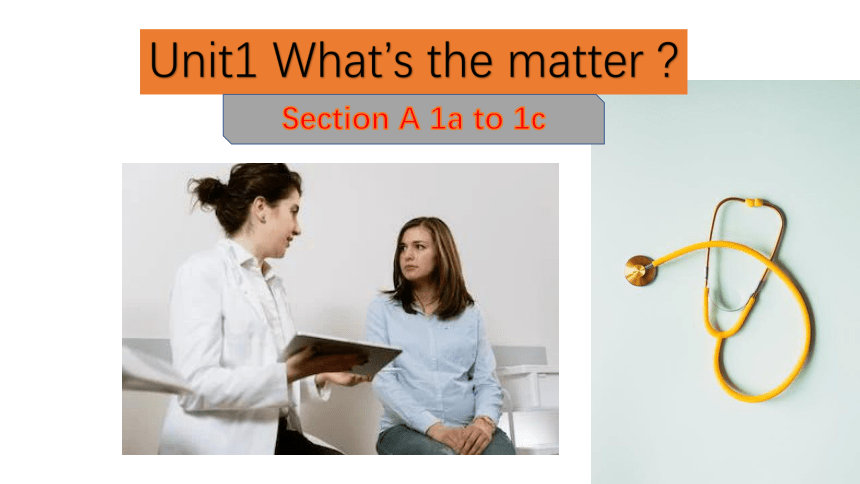 | |
| 格式 | zip | ||
| 文件大小 | 3.1MB | ||
| 资源类型 | 试卷 | ||
| 版本资源 | 人教新目标(Go for it)版 | ||
| 科目 | 英语 | ||
| 更新时间 | 2023-02-07 16:31:03 | ||
图片预览

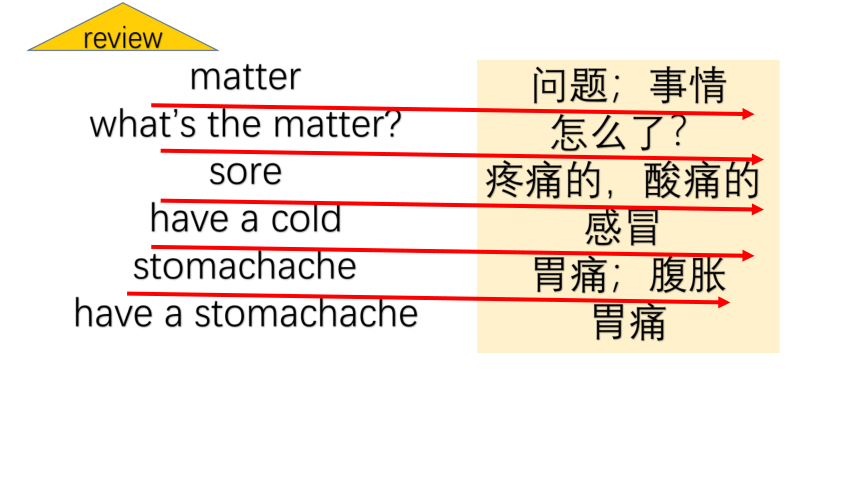
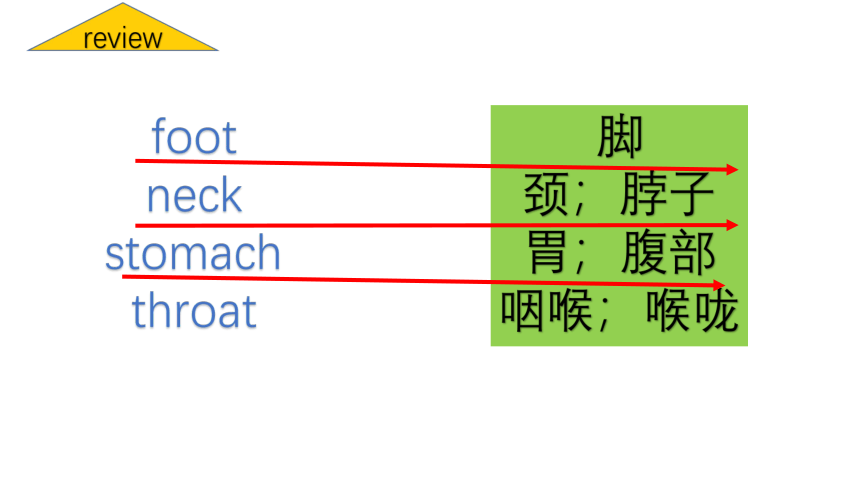
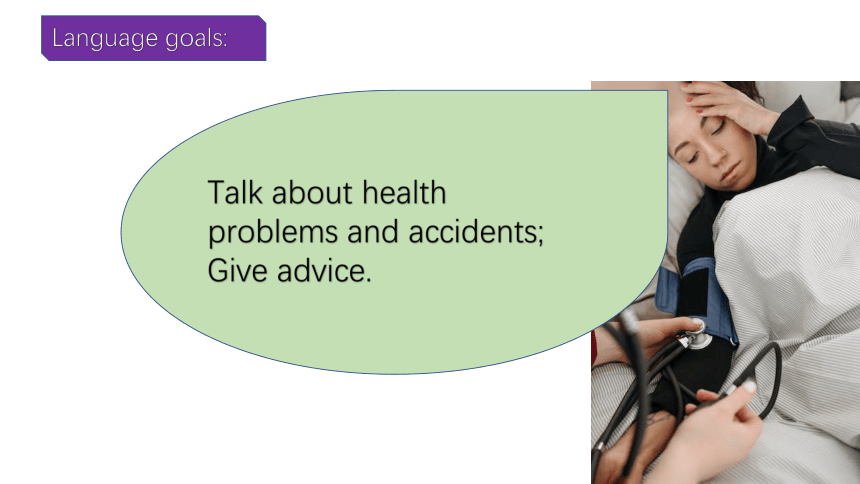
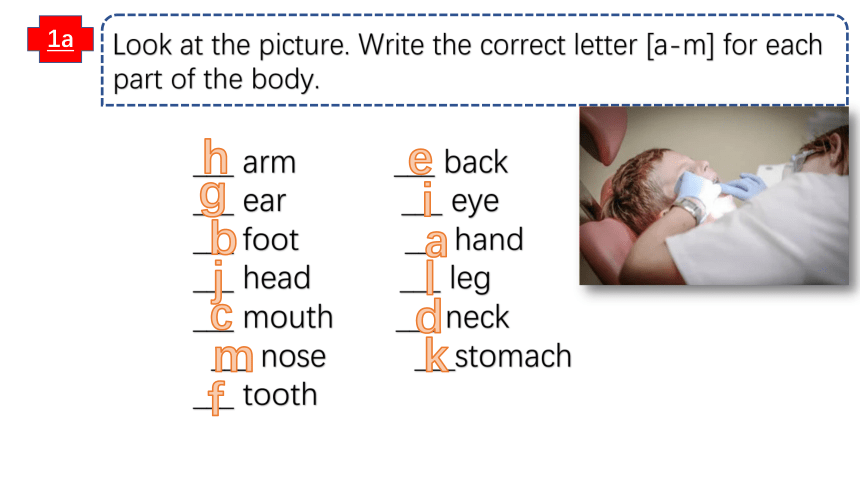
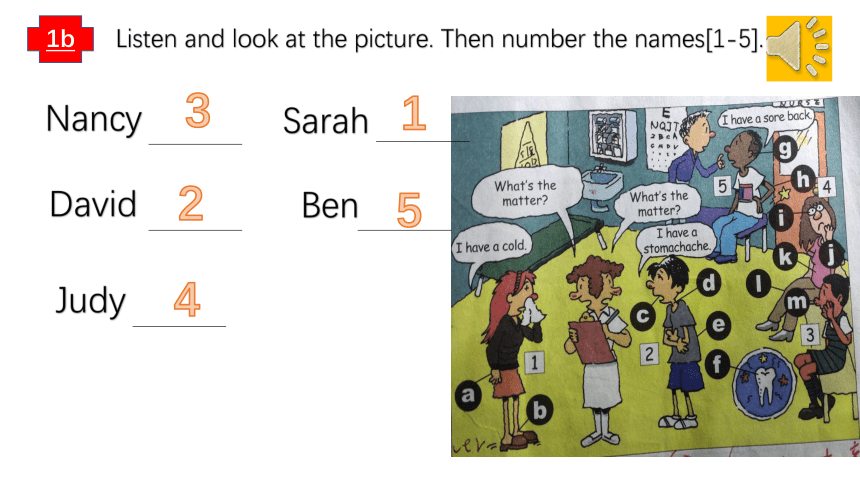
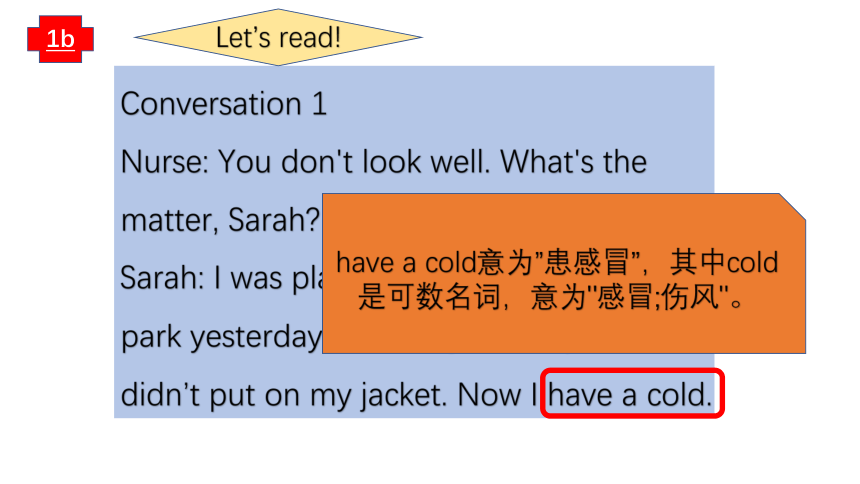
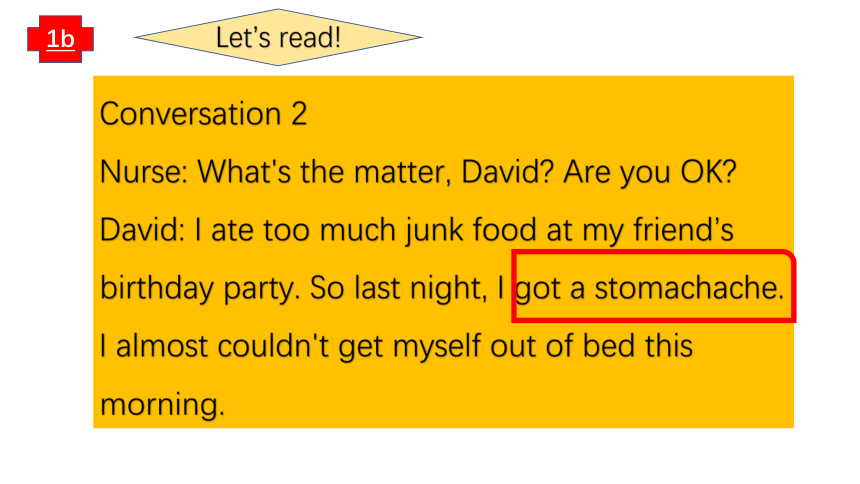
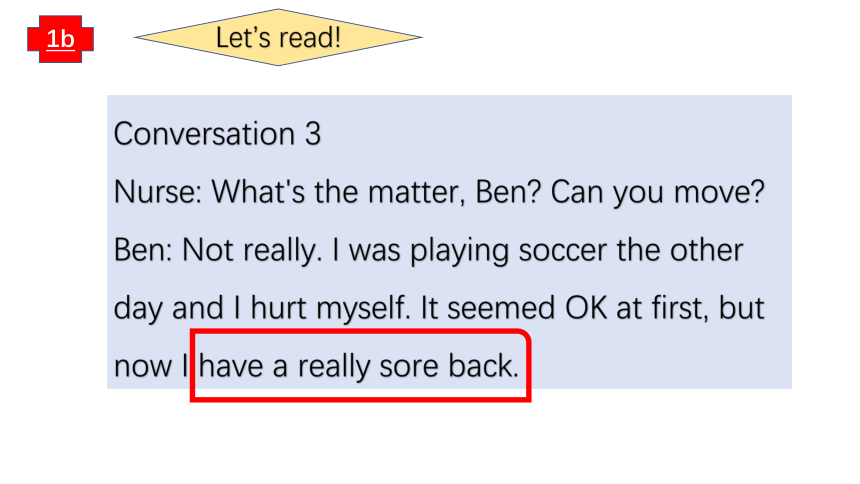
文档简介
(共21张PPT)
Unit1 What’s the matter
Section A 1a to 1c
问题;事情
怎么了?
疼痛的,酸痛的
感冒
胃痛;腹胀
胃痛
matter
what’s the matter
sore
have a cold
stomachache
have a stomachache
review
foot
neck
stomach
throat
review
脚
颈;脖子
胃;腹部
咽喉;喉咙
Language goals:
Talk about health problems and accidents;
Give advice.
1a
Look at the picture. Write the correct letter [a-m] for each part of the body.
___ arm ___ back
___ ear ___ eye
___ foot ___ hand
___ head ___ leg
___ mouth ___ neck
___ nose ___stomach
___ tooth
h
m
g
b
a
j
c
l
i
d
e
k
f
1b
Listen and look at the picture. Then number the names[1-5].
Nancy
David
Sarah
Judy
Ben
3
1
2
5
4
Conversation 1
Nurse: You don't look well. What's the matter, Sarah
Sarah: I was playing with my friends at the park yesterday. Then it got windy, but I didn’t put on my jacket. Now I have a cold.
1b
Let’s read!
have a cold意为”患感冒”,其中cold是可数名词,意为"感冒;伤风"。
Conversation 2
Nurse: What's the matter, David Are you OK
David: I ate too much junk food at my friend’s birthday party. So last night, I got a stomachache. I almost couldn't get myself out of bed this morning.
1b
Let’s read!
Conversation 3
Nurse: What's the matter, Ben Can you move
Ben: Not really. I was playing soccer the other day and I hurt myself. It seemed OK at first, but now I have a really sore back.
1b
Let’s read!
Conversation 4
Nurse: You look really tired. What's the matter, Nancy
Nancy: I didn't sleep very well last night . I have a toothache. It's terrible! I can’t really eat anything either. It hurts a lot.
1b
Let’s read!
Conversation 5
Nurse: What's the matter, Judy
Judy: I'm sorry, but it's very difficult for me to talk .
Nurse: Oh, dear. What's the matter
Judy: I talked too much yesterday and didn’t drink enough water. I have a very sore throat now.
1b
Let’s read!
1c
Look at the picture. What are the students’ problems
Make conversations.
A:What’s the matter with Judy
B:She talked too much yesterday and didn’t drink enough water.
She has a very sore throat now.
Language points:
句型What's the matter (with sb.) "(某人) 怎么了 ”
常用来询问某人患了何种疾病或遇到了何种麻烦,还可以用句型What's wrong (with sb.)
或What happened (to sb.) 替换。
这里的定冠词the 一定不能省略!
Language points:
表示有某种“病症;症状”,
常用"have +a (n) +疾病名称”结构,
have在此类短语中有“患上”的意思。
例: have a headache头痛
have a stomachache胃痛
have a toothache牙痛
Language points:
have a sore back背痛
have a sore throat喉咙痛
have a fever发烧
have a cough咳嗽
Language points:
too much意为"太多" ,有以下三种常见用法:
1、用作副词词组,修饰不及物动词。
例: My desk mate talks too much.
我的同桌说话太多。
Language points:
2、用作名词词组。
例: You have given me too much.
你已经给我太多了。
3、用作形容词词组,修饰不可数名词。
例: I drank too much beer last night.
昨天晚上我喝了太多啤酒。
Language points:
much too意为“太,非常”,
用作副词词组,
修饰形容词或副词,但不可修饰动词。
Language points:
enough作限定词,意为”足够的;充足的”,
修饰名词时,常放在名词之前,也可放在名词之后。
enough作副词,意为“足够;充分地”,修饰形容词、副词或动词,且置于被修饰词之后。
exercise
1.Have I given you
我给你的钱够了吗
2.Is the water for you
这水给你用够热吗
He runs .
他跑得足够快。
enough money/money enough
warm enough
quickly enough
Thank you!
Unit1 What’s the matter
Section A 1a to 1c
问题;事情
怎么了?
疼痛的,酸痛的
感冒
胃痛;腹胀
胃痛
matter
what’s the matter
sore
have a cold
stomachache
have a stomachache
review
foot
neck
stomach
throat
review
脚
颈;脖子
胃;腹部
咽喉;喉咙
Language goals:
Talk about health problems and accidents;
Give advice.
1a
Look at the picture. Write the correct letter [a-m] for each part of the body.
___ arm ___ back
___ ear ___ eye
___ foot ___ hand
___ head ___ leg
___ mouth ___ neck
___ nose ___stomach
___ tooth
h
m
g
b
a
j
c
l
i
d
e
k
f
1b
Listen and look at the picture. Then number the names[1-5].
Nancy
David
Sarah
Judy
Ben
3
1
2
5
4
Conversation 1
Nurse: You don't look well. What's the matter, Sarah
Sarah: I was playing with my friends at the park yesterday. Then it got windy, but I didn’t put on my jacket. Now I have a cold.
1b
Let’s read!
have a cold意为”患感冒”,其中cold是可数名词,意为"感冒;伤风"。
Conversation 2
Nurse: What's the matter, David Are you OK
David: I ate too much junk food at my friend’s birthday party. So last night, I got a stomachache. I almost couldn't get myself out of bed this morning.
1b
Let’s read!
Conversation 3
Nurse: What's the matter, Ben Can you move
Ben: Not really. I was playing soccer the other day and I hurt myself. It seemed OK at first, but now I have a really sore back.
1b
Let’s read!
Conversation 4
Nurse: You look really tired. What's the matter, Nancy
Nancy: I didn't sleep very well last night . I have a toothache. It's terrible! I can’t really eat anything either. It hurts a lot.
1b
Let’s read!
Conversation 5
Nurse: What's the matter, Judy
Judy: I'm sorry, but it's very difficult for me to talk .
Nurse: Oh, dear. What's the matter
Judy: I talked too much yesterday and didn’t drink enough water. I have a very sore throat now.
1b
Let’s read!
1c
Look at the picture. What are the students’ problems
Make conversations.
A:What’s the matter with Judy
B:She talked too much yesterday and didn’t drink enough water.
She has a very sore throat now.
Language points:
句型What's the matter (with sb.) "(某人) 怎么了 ”
常用来询问某人患了何种疾病或遇到了何种麻烦,还可以用句型What's wrong (with sb.)
或What happened (to sb.) 替换。
这里的定冠词the 一定不能省略!
Language points:
表示有某种“病症;症状”,
常用"have +a (n) +疾病名称”结构,
have在此类短语中有“患上”的意思。
例: have a headache头痛
have a stomachache胃痛
have a toothache牙痛
Language points:
have a sore back背痛
have a sore throat喉咙痛
have a fever发烧
have a cough咳嗽
Language points:
too much意为"太多" ,有以下三种常见用法:
1、用作副词词组,修饰不及物动词。
例: My desk mate talks too much.
我的同桌说话太多。
Language points:
2、用作名词词组。
例: You have given me too much.
你已经给我太多了。
3、用作形容词词组,修饰不可数名词。
例: I drank too much beer last night.
昨天晚上我喝了太多啤酒。
Language points:
much too意为“太,非常”,
用作副词词组,
修饰形容词或副词,但不可修饰动词。
Language points:
enough作限定词,意为”足够的;充足的”,
修饰名词时,常放在名词之前,也可放在名词之后。
enough作副词,意为“足够;充分地”,修饰形容词、副词或动词,且置于被修饰词之后。
exercise
1.Have I given you
我给你的钱够了吗
2.Is the water for you
这水给你用够热吗
He runs .
他跑得足够快。
enough money/money enough
warm enough
quickly enough
Thank you!
同课章节目录
- Unit 1 What's the matter?
- Section A
- Section B
- Unit 2 I'll help to clean up the city parks.
- Section A
- Section B
- Unit 3 Could you please clean your room?
- Section A
- Section B
- Unit 4 Why don't you talk to your parents?
- Section A
- Section B
- Unit 5 What were you doing when the rainstorm came
- Section A
- Section B
- Review of Units 1-5
- Unit 6 An old man tried to move the mountains.
- Section A
- Section B
- Unit 7 What's the highest mountain in the world?
- Section A
- Section B
- Unit 8 Have you read Treasure Island yet?
- Section A
- Section B
- Unit 9 Have you ever been to a museum?
- Section A
- Section B
- Unit 10 I've had this bike for three years.
- Section A
- Section B
